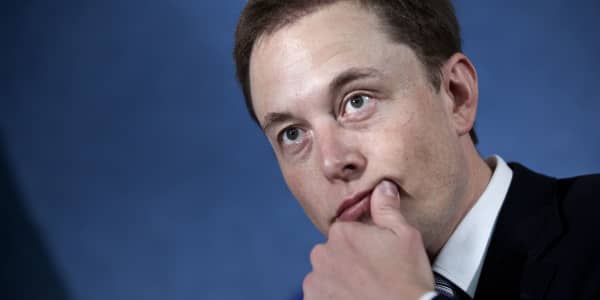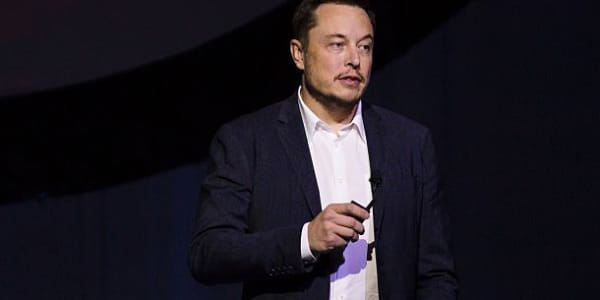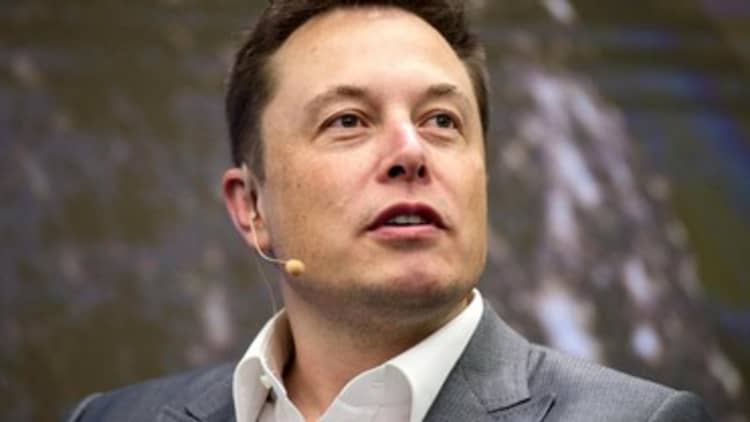
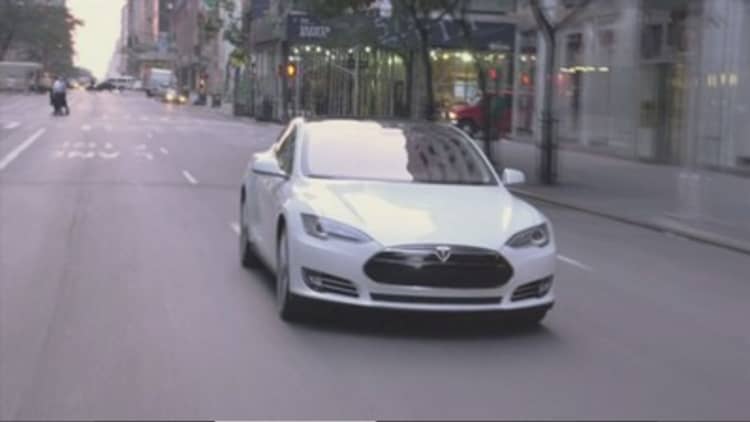
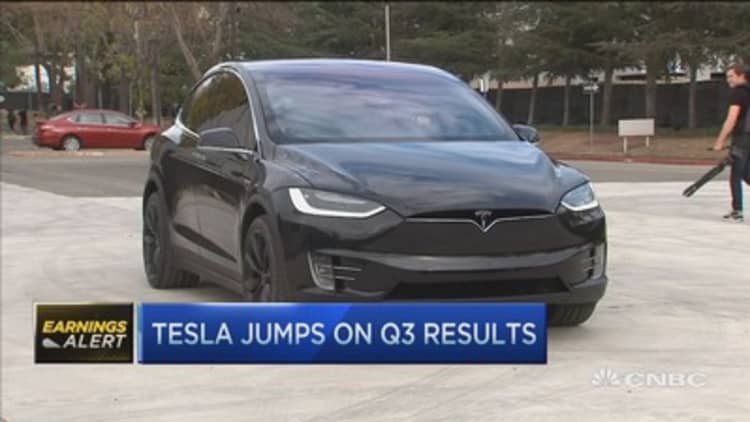
Amid the constant attention lavished on Elon Musk and Tesla Motors, one bit of news has been mostly overlooked: the world's leading electric-car maker is now growing faster outside the United States than in it.
Gaining the keys to Tesla global sales isn't why the company beat analysts' estimates in its recent earnings, bringing in $936.8 million in revenue and posting a loss of 58 cents a share that was narrower than the 60-cent loss analysts had forecast. The global acceleration isn't behind the critically important better-than-expected guidance Tesla gave Wall Street on how fast it will ramp fourth-quarter production of the Model X crossover. And it certainly hasn't helped Tesla stock, which has declined since its earnings and remains in the red year-to-date.
In an exchange that may tell volumes about Tesla's long-term future, CEO Musk told Goldman Sachs analyst Patrick Archambault that Tesla's recent investments in sales and charging networks have begun to kickstart sales abroad.
"I think we were actually relatively weak [previously] in Asia-Pacific and relatively weak in most countries in Europe," Musk said.
Musk continued: "We're fixing fundamental weaknesses by ensuring that we've got a good supercharger infrastructure, a good service center infrastructure, that any perceptions about the company are addressed. And in a lot of places, it takes time to build consumer confidence. They need to hear about Tesla a lot before they are comfortable making a significant asset purchase."
On Wednesday, Jeffrey Straubel, chief technology officer of Tesla and one of its co-founders, said that South Korea also has "great potential" and is a market that Tesla hopes to expand into in the future, according to reports in the South Korean press. "I can't give a very specific answer on when we will exactly start selling vehicles in Korea, but this is a market that we are committed to, and we think there is a great potential here," Straubel said at an energy conference held in South Korea.
Analysts say the Musk exchange with Goldman's analyst, and its global ambitions, aren't especially important to the short-term path of Tesla shares, which will be affected much more by the rollout of its SUV, the Model X, and how fast and inexpensively the company can bring its more mass-market Model III car to market.
"Faster order flow in Europe and Asia likely stems from Tesla adding new places to buy the car and allocating more cars to sell in those areas," said Theodore O'Neill, who follows Tesla for Ascendiant Capital Partners. "And the base to grow from in EU and Asia-Pacific is smaller."
Yet Musk's answer illustrates one of the most important opportunities — and challenges — Tesla faces in trying to build a global company that upends the car industry. It really needs the Chinese market to be a success.
Economic statistics shed light on the problem.
China has an estimated 3.6 million millionaires, trailing well behind the 6.9 million millionaires in the U.S., according to Boston Consulting Group. And while customers need not be millionaires to buy or lease Teslas, which frequently top $100,000, it doesn't hurt.
More importantly, China's count of millionaires rose by nearly half last year, according to BCG. The world's most populous country now has more millionaires than the top eight European nations combined. The number of U.S. millionaires grew by about 4.7 percent, according to BCG.
Tesla got off to a disappointing start in China after opening its first sales office in 2013. Tesla missed its own forecast that China would deliver a third of sales by the end of 2014 by a mile and, according to Chinese press reports cited by Reuters in October, laid off a significant part of its China staff. The company, which does not regularly release China sales data, said in late October that it had sold 3,025 Model S cars in the country from January to September.
Just as in the U.S., the company's biggest short-term problem in overseas markets is likely to be supply constraints, said analyst Efraim Levy of S&P Capital IQ.
"If they're hitting the maximum they can produce, the question is what they can make rather than what they can sell," Levy said. "The growth will come sooner, especially if they hit their objectives with the III. They'll need to sell that globally, not just in the U.S."
When recently speaking in China, Musk said Tesla may begin producing cars in China within two years. Musk said Chinese production — the company is in discussions with a local partner — would be key to lowering the Tesla pricing by up to one-third in China, according to remarks Tesla provided to the press translated from Chinese transcripts.
Yet analysts generally are not even trying to forecast Tesla's sales by country. Concerns about the coverage of Tesla's Supercharger network to support longer trips held back sales in a country also known for epic traffic jams that cut into how many miles a car could travel on a single battery charge, raising the risk that drivers might get stranded.
Tesla is already working with Chinese Internet company Baidu on GPS navigation and automated driving.
Though Tesla has invested heavily in charging stations, the networks are still not comprehensive enough to satisfy many drivers, said IHS Automotive analyst Stephanie Brinley. Electric cars have also been held back by falling gasoline prices and the lessening of tax incentives to buy electric vehicles in some countries.
"Even if you buy a $100,000 car, you still have a budget," Brinley said.
Morningstar equity analyst David Whiston put it this way: "Even rich guys don't buy cars when the economy or the market get slammed."
Despite wide swings this summer, the Shanghai Composite Index is still up by 10 percent year-to-date.
Tesla has been promoting its cars more heavily in China this year, prompting it to make some of its first disclosures ever about sales in the country, which it said have accelerated, thanks to the opening of two new showrooms and the relaxation of regulatory restrictions.
Of the 3,025 Teslas sold overall, Chinese consumers bought 1,345 Teslas in the third quarter, up from 797 in the first quarter and 883 in the second, the company said in its recent China sales disclosure. Musk told China's official Xinhua News Agency that China's sales could catch up to those in the U.S. within five to six years. Chinese sales represented almost 12 percent of the 11,603 vehicles Tesla reported delivering in the third quarter.
Whiston said the big risk in China is the same as it is everywhere else: that Tesla doesn't deliver on its promise that the Model III, expected to be unveiled next March, be a more mass-market-priced car. Those anxieties were fueled by Morgan Stanley auto analyst Adam Jonas' estimates that early Model IIIs with longer range will cost more like $60,000 than the $35,000 base price the company has talked about more often — and which would be in line with pricing on popular electric-car models from existing auto makers, like the Nissan Leaf.
— By Tim Mullaney, special to CNBC.com







